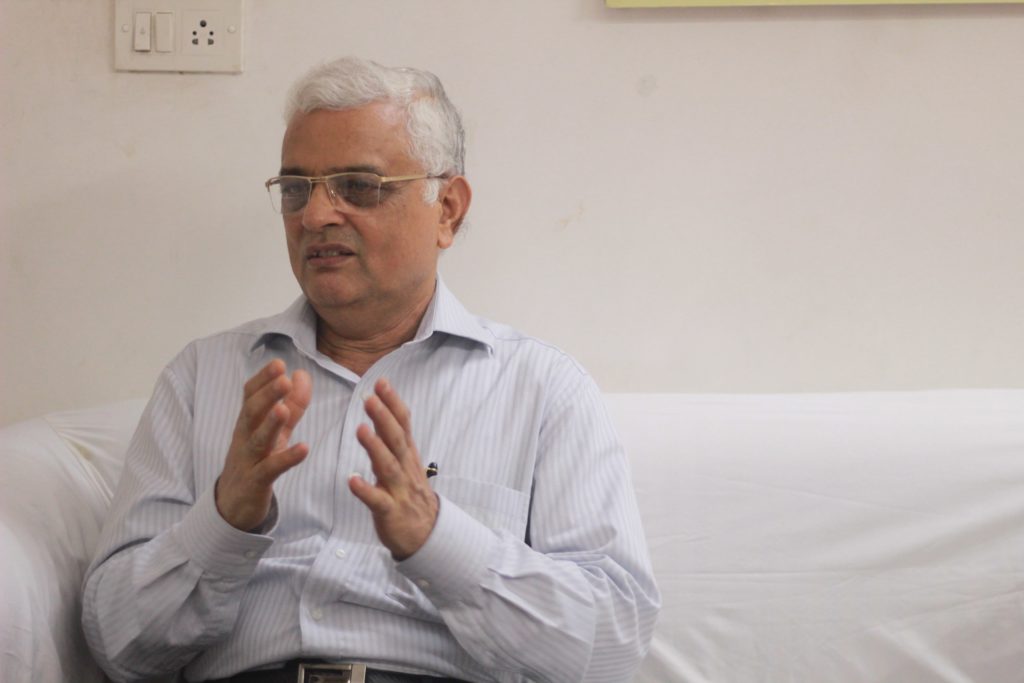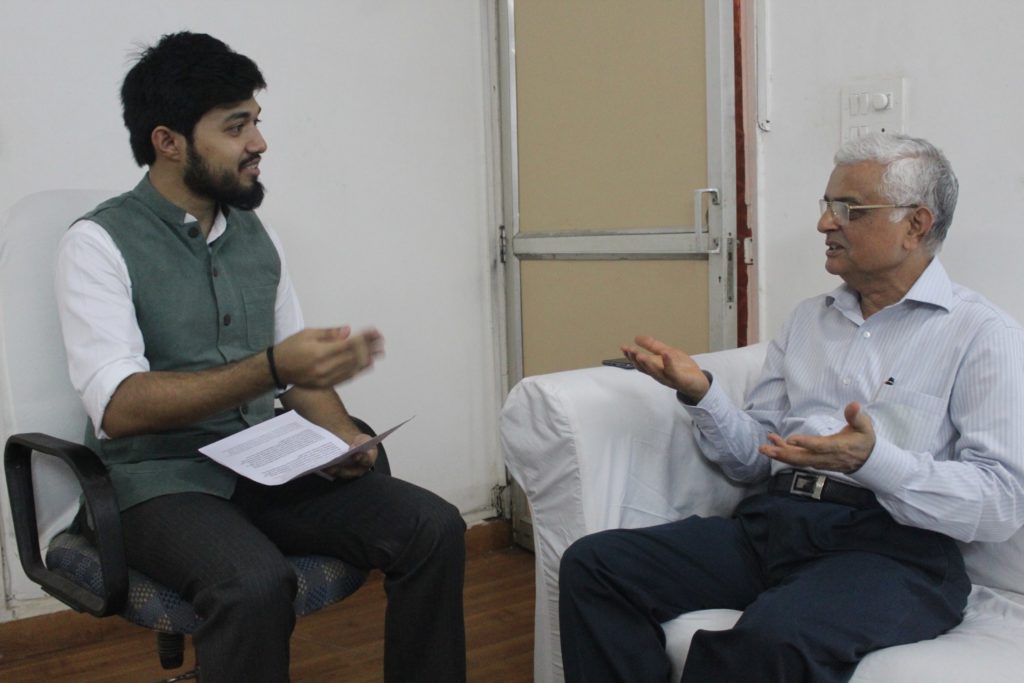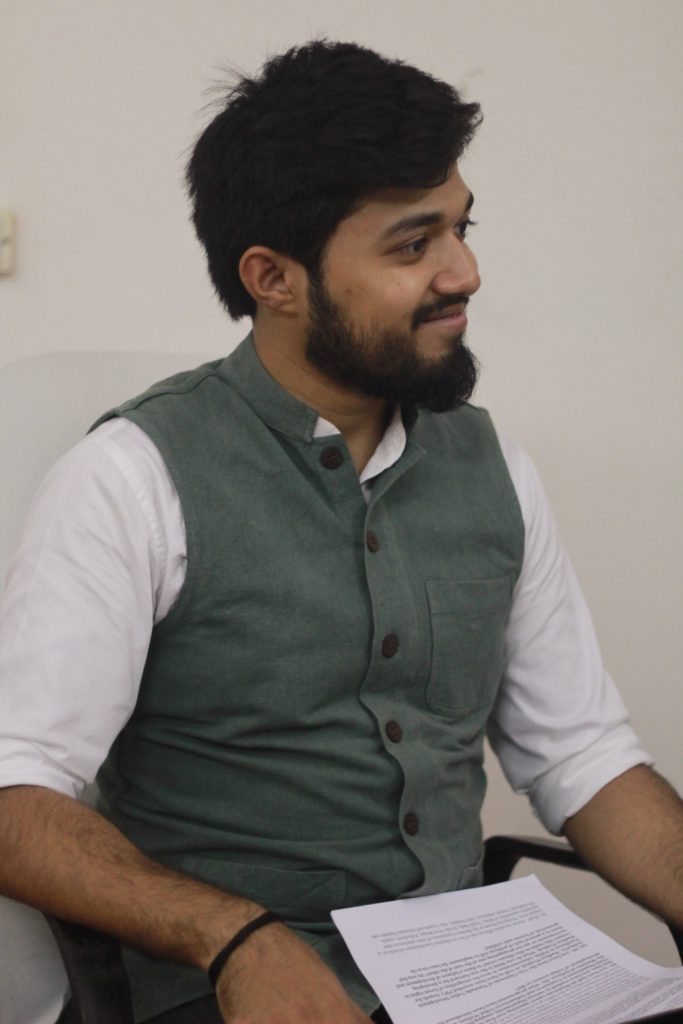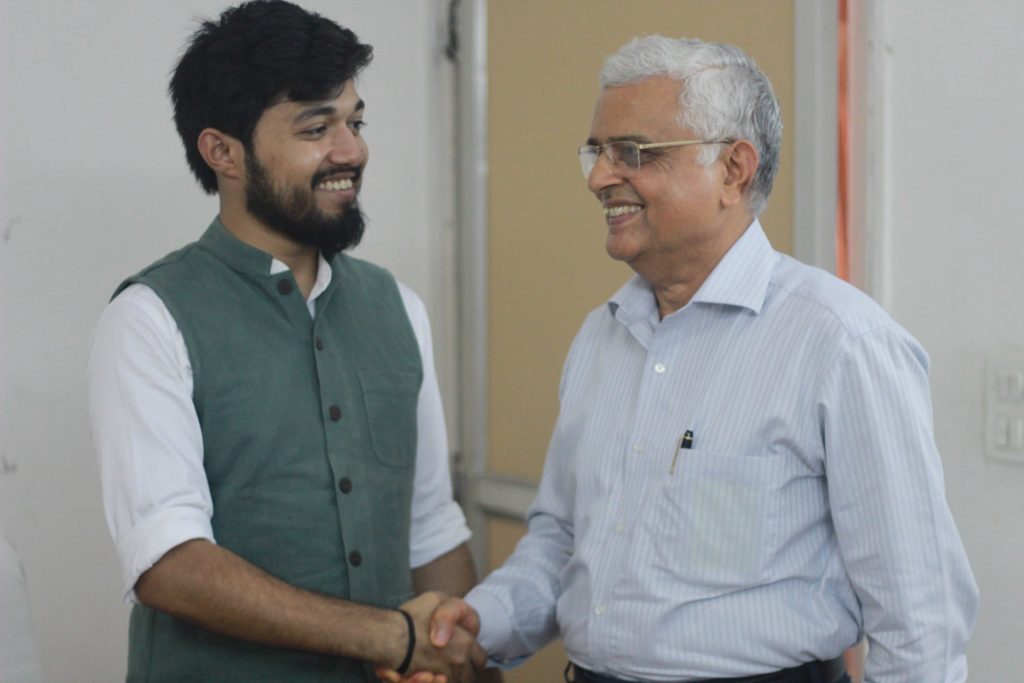Om Prakash Rawat is a retired 1977 batch Indian Administrative Services (IAS) officer who served in various positions for both the Government of India and the Government of Madhya Pradesh before serving as the 22nd Chief Election Commissioner of India.

Greetings Sir! Thank you for meeting us and graciously allowing us to interview you. We are very keen on learning from your experience and hearing your ideas on our Indian electoral politics.
Sir, you joined the Election Commission of India (ECI) in 2015 and served as the Chief Election Commissioner for about eleven months in 2018, before retiring in December. How was your experience in the Election Commission?
Excellent! In fact, I joined on the 14th August, 2015 and, from 2015 to January 2018, I was the Election Commissioner. The experience was very good because the first election was in Bihar. The ECI ensured that the Bihar election to take place in a peaceful manner, without a single violent incident taking place. But despite that, we had lost the lives of 17 of our presiding officers, polling officers, and security personnel. Even when there was no violence, most of the time the scenario was stressful –some politicians were shouting, some politicians were saying “yeh galat ho raha hai, isko theek kariye [this is wrong, fix this]”. It instilled in me a sense of informing all the government employees or employees anywhere that one’s first priority should always be oneself. One must take care of oneself first and then of everyone else.

Have you encountered any pressure or firsthand violence at the polling booths? By this, I not only mean from the political parties, but also from the other stakeholders involved in the electoral process.
Yes. I witnessed two to three incidents because I was an observer too. I was an observer during South Africa’s post-Apartheid election in 1994. There, I found that it was really violent, whites were just about 15% and Africans were about 85%. But still, the whites were feeling that they will win which led to a few violent incidents.
What was the outcome eventually?
Eventually, Nelson Mandela won with 88% seats. The same thing happened with India as well. I observed that in Andhra Pradesh, when women organized themselves and had won the agitation against Arak, they had a taste of victory among them. So, when elections were held later, I was an observer in a very important constituency. And there, I got the news that a team of hooligans with guns is capturing booths and stuffing ballots. So, I asked my driver to get there. Since I was about 50 km away, I reached 40 minutes later. By that time, it was an all-women polling station where they had entered, and it was the third station where the booth-capturing gang had entered. The 15-20 women inside bolted the polling station from the inside. They had some stones, they started beating them up. They were so badly beaten that one of them died. The kind of the empowerment of women was something that I saw there.
What are some of the hurdles/setbacks an Election Commissioner (EC) has to face on an everyday basis?
I don’t really see any hurdles or setbacks. The Election Commission has got immense powers. Article 324! An hon’ble Supreme Court ruling in Mahendra Singh Gill vs CEC case of 1977 said that whenever any situation arises when law doesn’t provide for any power, the Commission or CEC is not supposed to fold hands and pray to God to provide power. Whatever they decide, drawing power from the reservoir of the power of Article 324, that becomes the right dispensation. They can do anything. We have been using that very frequently. For instance, when we found that one particular officer was totally partisan, we immediately asked to remove him. The Chief Minister became very angry and refused to remove him. However, the Commission immediately held that if the officer isn’t removed within the next two hours, the elections will be cancelled. The Chief Secretary informed the Chief Minister that if the election is cancelled, the legislative assembly will have to resign in 27 days, wherein more problems like the President’s rule will be enforced and it will be the end of it. Within 15 minutes, not only did the order come to us but, even the officer was sent back. That is the kind of power the Election Commission holds.
With the rising influence of social media, do you feel that the ECI is able to successfully tackle the spread of fake news and trolling during election season? Also, what are some of the steps you would suggest that can make the EC more adept at handling the new trends of digital media?

Actually, this is the most important emerging threat and ECI is adept at it. In fact, as soon as we realized that this kind of threat has affected the referendum in the UK, the election in the US, etc., we had immediately set up a social media hub under the ECI so as to monitor whatever was happening. To tackle fake news, we had also asked for fact-checking by these platforms. For all those arrangements, the ECI got together with the social media heads to put in place certain mechanisms. So, steps have been taken, but the threat is of unknown proportion. And therefore, a lot of work needs to be done continuously.
Largely in the case of the USA, if we talk about it, the threat of fake news was emerging from other hostile nations. Do you think India also faces a similar situation wherein powers not just from within but from outside as well can pose a threat to our democracy?
We did not experience any such thing but you cannot rule out the possibility. This is because when somebody has the capability of influencing the election in some other country, how can you stop them from doing it here? Therefore, this threat is present and the ECI must take all steps necessary to prevent it.
In October 2017, you had announced that the Election Commission will be “logistically equipped” to hold simultaneous polls for the Lok Sabha and Assemblies by September 2018. What are some of the pros and cons of the idea of “One Nation, One Poll” in the Indian context wherein there is so much diversity that polling stations need to be established within at least 2 km of registered voters?
Actually, first, I would like to correct that statement. It wasn’t as if we are ready to have simultaneous elections in September 2018. What I had said was that, in case the necessary amendments to the Constitution and the RP Act are put in place, and if money is made available (including the required number of EVMs and VVPATs), then we’ll be ready to hold simultaneous elections within one year. That was my statement. But since the RP Act amendments were not made, there’s no question of having simultaneous elections anytime soon. The second thing is, simultaneous elections were held in our country on four occasions – in 1952, 1957, 1962 and 1967. So, there is no practical, logistical or any other difficulty in holding simultaneous elections. Only after 1967, when politics started taking a toll on housing, dissolving early, dismissing government and posing President’s rule, that is where the synchronization started breaking off. So, if there is an attempt to bring synchronization again in the elections, first they have to start by amending the law and Constitution because the Election Commission is bound by the Constitutional law. So long as it isn’t amended, every time any state elections are coming, they will issue notification any day because they are bound to do so. They can’t say ‘ab simultaneously wait karenge’. They’ll have to issue it because they are bound to do that as soon as the term is expiring, because within six months from that day, they have to start the election process. And, we’ve been doing that continuously.
Sir, you have remarked that demonetization has had “absolutely no impact” as far as black money vis-à-vis election campaigns are concerned. A single candidate is allowed to spend an average of Rs 50 to 70 lakhs in his campaign. However, in reality, the spent amount is more than ten times than what is allowed. What are some of the trickery politicians use to circumvent the law? And, what updated measures can be taken to curb this practice?
Actually, during elections, the ceiling on the candidate expenditure is 28 lakhs for big states and 70 lakhs for Lok Sabha elections. The problem comes when one talks about the party expenditure because there is no ceiling on the party expenditure. So, for instance, a candidate standing for the Lok Sabha election reports that he has spent 40-42 lakhs. However, his party spends for instance, 10 crores. This creates a sort of impression that a lot of money has been spent. But this isn’t an accurate picture because the candidate himself has spent within the limit. It is the party expenditure which is high, but one cannot do anything because there is no limit prescribed for a party. The EC has no authority to delve into their expenditure, to monitor it or to seize their money. So, all those issues exist. The Election Commission has held an All-Party Meeting where all parties, excluding three, I think, unanimously agreed on a ceiling on expenditure. Once that ceiling is put in place by the law, then the use of money will be reduced considerably. Yet, there will be many more things required to be done to prevent the abuse of money.
When the ECI refused to disclose the dissent note of Election Commissioner Ashok Lavasa over clean chits given to four speeches by PM Narendra Modi and Amit Shah, it raised serious doubts in the public over the credibility and fairness of deliberations in the Election Commission. With reference to Article 324 and various Supreme Court judgments, do you feel that the ECI’s deliberations and communications should be made public? What are the pros and cons of the same?
Actually, that has been the case. Deliberations are all made public. They are put on the ECI website. However, the idea is that whenever certain things are processed ‘on file’ and not through the Commission’s decision, it is taken on file by circulation. That is not considered as a decision and that is not uploaded on the website. But even under the RTI Act, anybody can seek a copy of that for a reference. It is also readily available to the public. I don’t think there was much issue about that but, only a media stunt. I think that only one newspaper reported the existence of a note of dissent. To name it, it was the Indian Express. Then, on 17 May, I saw it in the Hindustan Times. On 18 May, the election process was over. So that was worthless.

The new cVigil app launched by the Election Commission of India was expected to create a fast-track complaint reception and redressal system. What were its distinctive characteristics? How successful/effective has it been, especially in the last General Elections?
This has been very effective. It has empowered voters beyond anything. It originated in the Karnataka election when I was on the late-night polls. I complained to the Police Commissioner that liquor distribution was being done and nobody’s coming. I realized that there is a need to hand over the policing even to the common man. At that time, it was run on a pilot basis in Bangalore, and 800 complaints were registered. You had to complete the action within 100 minutes and report what actions had been taken. Everybody was looking at the mobile phone. In this Lok Sabha elections, I think, more than 5 lakh complaints were received and 95% of them were correct after which action was taken. It is a huge success, huge empowerment of voters as you don’t have to go anywhere. Just take a video and submit it! No number, nothing is required. Another important feature is that if you are dealing with a very high-stationed and mighty politician, you can just choose to hide your identity. Your number and name will not be shown. However, you will not get the compliance report. That, you will hear from the media. Your identity will remain completely anonymous, even the EC will not know.
I feel the ECI has time and again proven that they are capable of delivering free, fair and credible elections and, whatever reputation the ECI has built over the years is through the efforts of Mr. T.N. Seshan because it was during his watershed tenure on which the successive ECs have been built. I think the ECI is revered by one and all throughout the world. When I spoke at Harvard University and New York University about the elections, I found both the faculty and the students putting forth the idea that India is a developing country which has achieved a lot– cVigil, digitized electoral roll, all kind of things. So, that is the status of the Election Commission of India and our elections.
With this, we bid you goodbye. You are an inspiration to thousands of young men and women, and we thank you for your precious time.
Interviewer: Kunal Chauhan
Kunal is a Delhi based lawyer & policy analyst and has been working in the social sector since the last seven years. He is the Founder of ITISARAS and currently presides as the Chairman of the Governing Body of the organisation.


